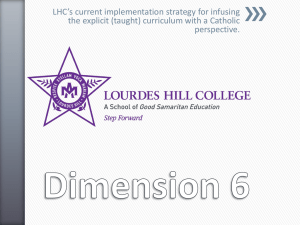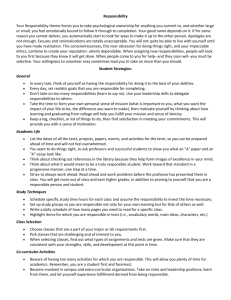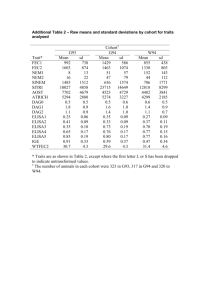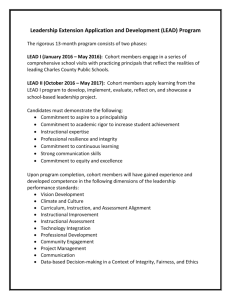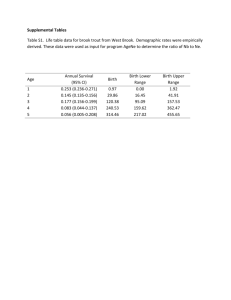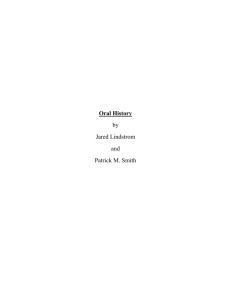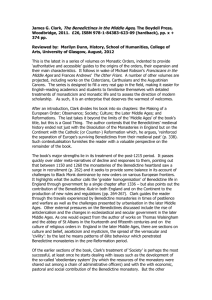FREQUENTLY ASKED QUESTIONS - Center for Values
advertisement
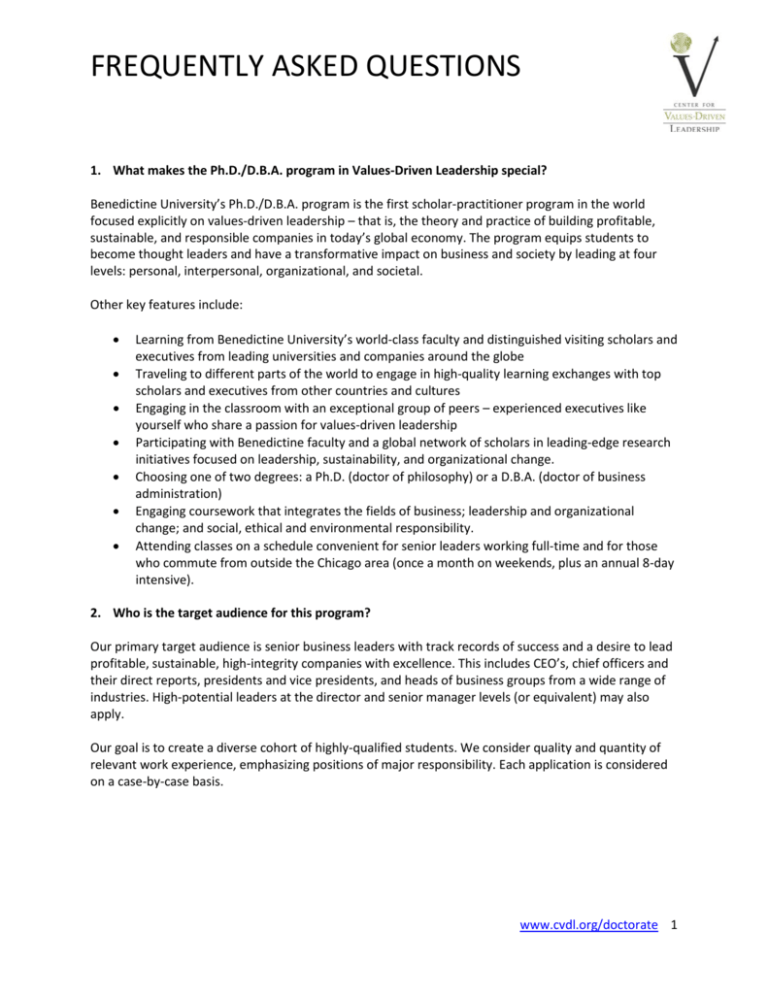
FREQUENTLY ASKED QUESTIONS 1. What makes the Ph.D./D.B.A. program in Values-Driven Leadership special? Benedictine University’s Ph.D./D.B.A. program is the first scholar-practitioner program in the world focused explicitly on values-driven leadership – that is, the theory and practice of building profitable, sustainable, and responsible companies in today’s global economy. The program equips students to become thought leaders and have a transformative impact on business and society by leading at four levels: personal, interpersonal, organizational, and societal. Other key features include: • • • • • • • Learning from Benedictine University’s world-class faculty and distinguished visiting scholars and executives from leading universities and companies around the globe Traveling to different parts of the world to engage in high-quality learning exchanges with top scholars and executives from other countries and cultures Engaging in the classroom with an exceptional group of peers – experienced executives like yourself who share a passion for values-driven leadership Participating with Benedictine faculty and a global network of scholars in leading-edge research initiatives focused on leadership, sustainability, and organizational change. Choosing one of two degrees: a Ph.D. (doctor of philosophy) or a D.B.A. (doctor of business administration) Engaging coursework that integrates the fields of business; leadership and organizational change; and social, ethical and environmental responsibility. Attending classes on a schedule convenient for senior leaders working full-time and for those who commute from outside the Chicago area (once a month on weekends, plus an annual 8-day intensive). 2. Who is the target audience for this program? Our primary target audience is senior business leaders with track records of success and a desire to lead profitable, sustainable, high-integrity companies with excellence. This includes CEO’s, chief officers and their direct reports, presidents and vice presidents, and heads of business groups from a wide range of industries. High-potential leaders at the director and senior manager levels (or equivalent) may also apply. Our goal is to create a diverse cohort of highly-qualified students. We consider quality and quantity of relevant work experience, emphasizing positions of major responsibility. Each application is considered on a case-by-case basis. www.cvdl.org/doctorate 1 FREQUENTLY ASKED QUESTIONS 3. What is the makeup of your current student body? Student information is provided below. Dissertation titles for Cohort 1 are presented in italics. Cohort 1 Anna Amato President, edtec central Ferndale, Michigan Searching for the links between culture and performance: An in-depth look at one company’s journey from imagined to transformational change. Shannon Brown Vice President, Exemplify Naperville, IL How do values-driven organizations manage critical incidents? The role of organizational identity, organizational culture, and sensemaking. Andrea Browne-Phillips Principal, Madison Strategy Group Washington, DC What is the relationship between values-based leadership and business? Kerrie Aman Carfagno Adjunct Lecturer, John Carroll University, University Heights, OH Social media's impact on leadership and organizations during crisis management. Basil Chen Professor, Centennial College Toronto, Ontario, Canada Constructing positive organization identity with virtuous positive practices. Mike Chikeleze Associate Dean of Business, Cincinnati State College Cincinnati, OH What is your ethical leadership style? The creation and validation of an ethical leadership style questionnaire. Lee DeRemer Colonel (retired), U.S. Air Force Associate, Booz Allen Hamilton York, PA The nature of mid-life introspection. Barbara Fahey President, Fahey Associates, Inc Glen Ellyn, IL How do a founder/entrepreneur's values contribute to business viability? Greg Hinton Chief Diversity Officer, Democratic National Committee Washington, DC Top talent: Leading diversity as a strategic resource in the corporate and government sectors. Indigo Johnson CEO, Careers in Transition Atlanta, GA Leading out of the darkness into the light: My story of building a business as a leader with bipolar disorder. www.cvdl.org/doctorate 2 FREQUENTLY ASKED QUESTIONS Denise Lackey Emotional Resilience Practitioner, Step of Faith Health & Wellness Ministries, Inc. Cincinnati, OH Self-regulation and heart rate variability biofeedback: Promoting psychological resilience in healthcare leader Carolyn Maraist, Ed.D. Director, AAP Glencoe, IL A cross-cultural narrative exploration of the life stories of Chinese and American peacebuilders. Premalatha (Prem) Mony Physical Medicine Supervisor, Good Samaritan Hospital Winfield, IL Competing values in healthcare leadership. Lee Murphy CEO, Integrated Case Management Naperville, IL The impact of positive practices on performance. Shaun Passley CEO, Epazz Chicago, IL Growth process: Concept to self-sustaining enterprise. Joe Ricciardi Lieutenant Colonel, U.S. Army Reserves, Director, HAVI Global Solutions Valparaiso, IN To lead is to love: The role of love in leadership. Kimberly Sebastian Director U.S. Cellular Chicago, IL Driving business performance amidst transformational change through the use of emotional intelligence. Dave Smith Lieutenant Colonel (retired), U.S. Air Force; Associate, Booz Allen Hamilton Panama City, FL How do leaders influence and maintain virtuous organizational cultures? Joanna Beth Tweedy Dean of Academic Affairs, Benedictine University Springfield, IL Sustainability and flourishing: What’s love got to do with it? Benny White Lieutenant Colonel (retired), U.S. Army; Consultant, Global Resource Solutions Naperville, IL Creation of the Return on Values pilot survey Otis Williams CEO, Otis Williams Limitless Cincinnati, OH Courageous leadership: The causes and consequences of acting in a morally courageous way when faced with costly ethical dilemmas. Jacquelyn (Jackie) Woodard Senior Vice President, RBS Citizens Boston, MA How the intentional focus on values and legacy transforms a seasoned leader. www.cvdl.org/doctorate 3 FREQUENTLY ASKED QUESTIONS Cohort 2 Walter Baehrend Senior Manager, Alcatel-Lucent Naperville, IL Claude Grimes Director, Human Resources, Siemens Chicago, IL Sherri Black Senior Manager, Visteon Corporation Dearborn, MI Kathy Hannan National Managing Partner, Diversity and Corporate Responsibility, KPMG, Chicago, IL Paul M. Booth, Jr. CEO Momentum Restaurants/McDonald’s Cincinnati, OH Wayne Brown Captain (retired), U.S. Coast Guard; Principal Analyst of Homeland Security, The SI Organization Haymarket, VA Steve Carter President, The Carter Group Chicago, IL Donna Darr Visiting Professor, Keller Graduate School of Mgmt. at DeVry University Chicago, IL Bryan Frederick Associate Director, Benedictine University Lisle, IL John Heiser COO, Magnetrol International, Inc. Aurora, IL Tina Huesing Chief Consultant, Wyrmwood Consulting Munich, Germany Michael Kuppinger EVP/GM of Engineering Services, Environmental Systems Design, Inc. Chicago, IL Olinda Lemus VP Regional Operations Manager, BMO Harris West Chicago, IL Michele (Shelly) Major VP Chief Nursing Officer, The Methodist Hospitals Mokena, IL Jean Manning VP Marketing and Communications, Cincinnati State Tech. & Comm. College Cincinnati, OH Chantel Moore Data Analyst/Accreditation Specialist, American Osteopathic Association Aurora, IL Mary Rosswurm Executive Director, Little Star Center, Inc. Zionsville, IN Clarke Sabandal Regional VP, Fresenius Medical Care Walnut Creek, CA Matt Schatteman General Sales Manager, Catching Fluidpower Bolingbrook, IL Kasey Short Director, Menu Innovation, McDonald’s USA Oak Brook, IL Remi Vespa CEO, Blue Trail Software Holding San Francisco, CA Carla Worthey AVP, Strategic Analytics, HCA, Inc. Nashville, TN www.cvdl.org/doctorate 4 FREQUENTLY ASKED QUESTIONS 4. How does this program compare with other programs? When designing the Ph.D./D.B.A. Program in Values-Driven Leadership, we conducted extensive research into 75 programs focused on leadership, sustainability, corporate social responsibility, and organizational change. We evaluated them in terms of: Curriculum (is it exceptionally high-quality; does it focus on leading sustainable companies in today’s global economy; does it equip people to lead at four levels: personally, interpersonally, organizationally, and strategically?) – Length of program – Degree type (Ph.D., D.B.A., Ed.D., etc.) – Target audience (i.e. senior leaders) – Format: cohort or non-cohort – When and where classes meet – Scholar-practitioner vs. traditional program – Use of visiting global thought leaders (scholars and executives) – Number and quality of global exchanges – Ability for students to be involved with faculty in leading-edge research initiatives We found no other program that incorporates all of these features into the unique and powerful combination offered by our Ph.D./D.B.A. Program in Values-Driven Leadership. – There are a number of outstanding traditional Ph.D. programs in leadership, corporate responsibility, and corporate sustainability, but most of these programs are not targeted to senior leaders and require people to leave their jobs and become full-time students. There are a number of excellent Ed.D. programs in leadership, but these focus primarily on leadership in higher education. There are a number of high-quality Ph.D. programs in leadership for working professionals, but none of these are targeted specifically at senior leaders; offer both a Ph.D. and D.B.A. track; focus on strategic leadership at the forefront of business and society; or offer the same quality of global exchanges, research opportunities, and access to thought leaders from around the world. We believe we hold a strong competitive position in comparison to other Ph.D. and D.B.A. programs in leadership, sustainability, and organizational change. 5. How does Benedictine University’s Ph.D./D.B.A. program in Values-Driven Leadership compare to Benedictine’s Ph.D. program in Organization Development? The Ph.D./D.B.A. program in Values-Driven Leadership builds on and extends the success of the Ph.D. OD Program by using a similar format but targeting a different audience and offering a new and distinctive multidisciplinary curriculum focused on strategic leadership and corporate sustainability. Similarities to the Ph.D. OD program include: www.cvdl.org/doctorate 5 FREQUENTLY ASKED QUESTIONS – – – – – Tailoring the program to working professionals (weekend classes, etc.) Using a cohort model Exposing students to state-of-the-art knowledge with an optimal blend of core faculty and world-renowned visiting scholars and executives Engaging in global exchanges and international learning experiences Establishing a leadership position in the field through research, publications, presentations, and leadership in professional associations Distinctive differences include: – – – The Target Audience – While the Ph.D. OD is targeted at working professionals at all levels, the Ph.D./D.B.A. in Values-Driven Leadership is targeted at senior leaders (VP level and above). The Format – While the Ph.D. OD holds classes on weekends 16 times per year, the Ph.D./D.B.A. in Values-Driven Leadership holds classes on weekends once a month, plus an annual 8-day intensive. The Content – Whereas the Ph.D. OD curriculum focuses on organization development, the Ph.D./D.B.A. in Values-Driven Leadership curriculum focuses on three core areas only briefly addressed in the Ph.D. OD: (1) the theory and practice of leadership and leadership development, (2) strategic leadership in the global economy, and (3) leading corporate sustainability and social responsibility. 6. Who are your core faculty? James D. Ludema, Ph.D., is Co-founder and Director of the Center for Values-Driven Leadership and a Professor of Leadership and Change at Benedictine University. Dr. Ludema’s book, The Appreciative Inquiry Summit: A Practitioner’s Guide for Leading Large-Scale Change is widely considered a classic in the field. Michael Manning, Ph.D., is a Professor of Leadership, Strategy and Change and is an associate editor of the Journal of Applied Behavioral Science. Dr. Manning teaches and consults throughout the U.S. and internationally in Mexico, Europe, the Baltic States, the Middle East and the Far East. Marie Di Virgilio, Ph.D., Administrative Director and core faculty member, brings over 30 years of business experience, much of it with Allstate Insurance Company. She teaches internationally in Poland, the Czech Republic, France, Viet Nam, and China. James (Gus) Gustafson, Ph.D., is the Director of Executive Education and Leadership Scholar-inResidence. Dr. Gustafson is Chair of the Business Leadership Division of the International Leadership Association. Prior to coming to Benedictine, he was Director of Strategic Leadership Research, and Development and Organizational Transformation at U.S. Cellular. www.cvdl.org/doctorate 6 FREQUENTLY ASKED QUESTIONS Kevin Lynch, Ph.D., is the Executive-in-Residence and oversees research initiatives and the Center’s consulting work. He served as Chief Financial Officer for Pritzker Realty Group, a privately held company in Chicago with assets of more than $6 billion. For more information, please visit our Faculty and Staff page. 7. Who are the distinguished visiting scholars and business leaders that come to present? Distinguished visiting scholars include: – – – – – – – – – – – – – – – – Dr. Robert Audi, Professor of Management and John A. O’Brien Professor of Philosophy, University of Notre Dame; Dr. Richard Boyatzis, Professor in Organizational Behavior, Psychology, and Cognitive Science departments, Case Western Reserve University; Dr. Bruce Buchowicz, Professor and Chair of the Department of Leadership and Human Resource Management in the School of Business and Management at National University in La Jolla, California; Dr. Kim Cameron, Professor of Management and Organizations, University of Michigan; Dr. Anjan Chakravartty, Professor of Philosophy, University of Notre Dame; Dr. Yochi Cohen-Charash, Associate Professor, Department of Psychology, Baruch College and the Graduate Center of CUNY; Dr. John Ehrenfeld retired Executive Director of the International Society for Industrial Ecology; Dr. Jeffrey Ford, Professor of Management in the Max M. Fisher College of Business at The Ohio State University; Dr. Ron Fry, Professor and Department Chair, Organizational Behavior, Weatherhead School of Management, Case Western Reserve University; Dr. Mary Gentile, Director, Giving Voice to Values, Senior Research Scholar, Babson College; Dr. Leigh Hafrey, Senior Lecturer, Behavioral and Policy Sciences, MIT Sloan School of Management; Dr. Stuart L. Hart, Samuel C. Johnson Chair in Sustainable Global Enterprise and Professor of Management at Cornell University's Johnson School of Management; Dr. Mary Jo Hatch, C. Coleman McGehee Eminent Scholars Research Professor Emerita of Banking and Commerce, University of Virginia, Adjunct and Visiting Professor Copenhagen Business School, Visiting Professor Singapore Management University, International Research Fellow, Said Business School, Oxford University; Dr. Bob Johansen, Distinguished Fellow, Institute for the Future; Dr. Chris Laszlo, Faculty Research Director of the Fowler Center for Sustainability Value at Case Western Reserve University; Dr. Rodney Ludema, Director of Graduate Studies, Department of Economics and School of Foreign Service, Georgetown University, former Senior Economist for President’s Council of Economic Advisors; www.cvdl.org/doctorate 7 FREQUENTLY ASKED QUESTIONS – – – – – – – – – – – Dr. Hunter Lovins, President and Founder of Natural Capitalism Solutions, Professor of Sustainable Business Management at Bainbridge Graduate Institute, Bard College, and Denver University; Dr. Cynthia McCauley, Senior Fellow in Research and Innovation at the Center for Creative Leadership; Dr. Carlos Mora, Research Scientist, Center for Positive Organizational Scholarship, Ross School of Business, University of Michigan; Dr. Peter Northouse, Professor Emeritus of Communication, Western Michigan University; Dr. Marc Orlitzky, Chair, Professor of Management, The University of South Australia; Dr. Joyce Osland, Lucas Endowed Professor of Global Leadership and Executive Director of Global Leadership Advancement Center, San Jose State University; Dr. Bill Pasmore, Visiting Professor of Social-Organizational Psychology, Teachers College Columbia University, Organization Practice Leader, The Center for Creative Leadership; Dr. Ron Riggio, Henry R. Kravis Professor of Leadership and Organizational Psychology at the Kravis Leadership Institute, Claremont McKenna College; Dr. Abraham (Rami) Shani, Professor of Management, Orfalea College of Business, California Polytechnic State University; Dr. Inger Stensaker, Professor in Strategic Change, NHH Norwegian School of Economics; Dr. Diane Swanson, The Edgerley Family Chair of Distinction, Professor of Management, Founding Chair, Business Ethics Education Initiative, College of Business Administration, Kansas State University. Distinguished visiting business leaders include: – – – – – – – – – – – – – Dr. Mona Amodeo, Founder and President idgroup; Mr. Chuck Bartels, retired Director for Global Social Responsibility and Knowledge Sharing, ManpowerGroup; Ms. Maureen Beal, CEO, National Van Lines; Mr. Mike Birck, retired founder and Chairman, Tellabs; Ms. Julie Brautigram, Director of Ethics, Compliance and Sustainability, Baxter International; Mr. Lyell Clarke, President and CEO, Clarke; Dr. Tom Griffin, independent consultant, adjunct faculty, The Chicago School of Professional Psychology Mr. Jim Kouzes, Best-selling author, former CEO, Tom Peters Company, Dean’s Executive Professor of Leadership, Leavey School of Business, Santa Clara University; Professor Harry Kraemer, Clinical Professor of Management and Strategy at Northwestern University's Kellogg School of Management; Ms. Erin Meezan, Vice President Sustainability, Interface, Inc.; Mr. Bill Pollard, former President and CEO, ServiceMaster; Mr. David Small, Vice President, McDonald’s Global Leadership Institute; Mr. Paul Spiegelman, Founder, BerylHealth and Chief Culture Officer, Stericycle; www.cvdl.org/doctorate 8 FREQUENTLY ASKED QUESTIONS – – – Mr. Tom Walter, CEO and Chief Culture Officer, Tasty Catering, author of It’s My Company Too!; Mr. Dan Webster, author and founder, Authentic Leadership, Inc. Mr. David Ziegler, Chairman of the Board of Directors, Ace Hardware Corporation. 8. What’s the difference between a Ph.D. and D.B.A. degree? The Ph.D. is a more scholarly degree, and the D.B.A. is a more practitioner-oriented degree. Students choose either the Ph.D. or the D.B.A. track when they enter the program but are free to change tracks anytime until late in the second year. During the two years of course work, students take the same courses whether they are in the Ph.D. or the D.B.A. track. The difference comes when it is time to conduct the dissertation research. Students in the Ph.D. track, complete their degree with a scholarly dissertation based on original research. Students in the D.B.A. track complete their degree with an applied dissertation (similar to a thorough case study) based on the design and implementation of a significant project or change initiative. 9. Can I get involved in research? Yes. Students are encouraged to work on research projects with Benedictine faculty and other scholars associated with the Ph.D./D.B.A. program. Through the Center for Values-Driven Leadership we are developing a variety of research initiatives focused on the exemplary practices of sustainable and socially-responsible companies and leaders. Our current focus, the Return on Values project, is a 3-year partnership with the Inc. Small Giants Community to explore the relationship between culture, values, and business success in small to mid-size companies. 10. Is there an international component to the program? Yes, our faculty members plan up to two trips per year to participate in international conferences and learning exchanges with scholars and business leaders around the globe. To date, trips have been taken to China, Dubai, France, Ghana, India, Ireland, Saudi Arabia, Scandinavia, South Africa, and the U.K. Students are required to participate in at least one global exchange during their time in the program and are welcome to participate in as many as they like. With faculty approval, students may also plan their own international exchanges (not led by faculty) if they wish. Students may participate in a global exchange anytime during the program and receive credit for it in the third year of the program. Students are responsible for their own expenses associated with the exchanges. 11. Are students expected to present papers and symposia at conferences? Yes, as thought leaders in the field, students are invited and expected to submit proposals for presentation at academic and professional conferences at the regional, national, and international levels. Costs associated with attending conferences are at the student’s expense. 12. Is a master’s degree required for admission into the program? www.cvdl.org/doctorate 9 FREQUENTLY ASKED QUESTIONS Yes, a master’s degree is required. On rare occasions, exceptions have been made for applicants with extensive senior leadership experience and non-master’s-degree education who demonstrate the capacity to undertake the extreme academic rigors of a doctoral program. 13. Who accredits the Ph.D./D.B.A. program in Values-Driven Leadership? The Ph.D./D.B.A. program in Values-Driven Leadership is offered through Benedictine University’s College of Business and is accredited by the Higher Learning Commission (HLC) of the North Central Association (NCA) of Colleges and Schools. 14. When is the application deadline? We will begin accepting applications April 1, 2014 for Cohort 3. Classes begin April 2015. The deadline for application is November 1, 2014. All applications received by November 1, 2014 will be given full consideration. Applications received after November 1, 2014 will be considered on a space-available basis. Please contact Deb Hellmuth at info@cvdl.org or 630-829-6225 for more information or to request an application packet. 15. How many apply for the program and how many students do you accept for each cohort? For Cohort 3, which begins April 2015, we anticipate over 500 inquiries resulting in approximately 50100 applicants. We will admit approximately 25 students. 16. When will interviews take place and when will selection decisions be made? Interviews with Ph.D./D.B.A. faculty and staff for Cohort 3 will take place November 2014 – January 2015. Cohort 3 applicants will be notified of decisions by the end of January 2015. 17. How often do you start a new cohort and when will the next cohort begin? Cohorts begin every two years (i.e., April 2015, April 2017, April 2019, etc.). Cohort 3 classes begin April 2015. 18. Where and when are classes held? For the first two years of the program, classes are held at Benedictine University’s Lisle, Illinois campus one weekend a month and during an annual 8-day intensive. Most weekend classes are held Friday 6:30 – 9:30 pm, and Saturday and Sunday 9:00 am – 4:00 pm. To accommodate our Senior Executive Roundtables and Leadership Lectures Series, approximately two to four times each year, classes are held Friday 1:00 – 9:00 pm, Saturday 9:00 am – 4:00 pm and Sunday 9:00 – Noon. Students are notified of class schedules well ahead of time. Classes during the annual 8-day intensives are usually held 8:00 am – 5:00 pm each day. www.cvdl.org/doctorate 10 FREQUENTLY ASKED QUESTIONS During the third year of the program, students work on their dissertations in collaboration with their dissertation committees. Typically, this is done via email and Skype or telephone conference calls so, except for graduation, students normally do not need to come to campus during their third year. The Ph.D./D.B.A. program is housed in Benedictine University’s new, state-of-the-art College of Business building on the top floor, which is dedicated exclusively to our doctoral programs. The new building is scheduled to open in the fall of 2015. Benedictine University’s Lisle campus is located a convenient 30 minutes from Chicago’s O’Hare and Midway airports. 19. Can this program be accomplished online? No, this is not an online program. One of the program’s greatest strengths is the deep learning that occurs in the classroom and elsewhere when cohort members meet face-to-face with one another, the Center for Values-Driven Leadership’s core faculty, and the world’s top visiting scholars and executives to exchange experiences and ideas at the forefront of leadership theory and practice. It is an exceptionally rich learning environment. 20. How long does it take to complete the program? This program is designed to be completed in three years. Classroom work is completed in the first two years. Students complete and defend their dissertations in the third year. 21. What is the completion rate? Since our first cohort of students has not yet completed the program, we do not have historical data on completion rates. However, the program is modeled after Benedictine University’s award-winning Ph.D. Program in Organization Development (OD), which started in 1997. The Ph.D. OD program enjoys a 9095% completion rate (compared to a national average of less than 50%), and we are on track to achieving the same level of success. 22. How many credit hours are needed to graduate? Students must complete 96 credit hours to graduate. 23. What is the cost of the program? The tuition is $38,000 per year for three years. Books are included in the tuition. Additional costs include transportation and accommodations and meals for each weekend class and the annual 8-day intensives. There are also expenses for trips to conferences, at which students give presentations and present papers; travel for the global exchanges/international aspect of the program; and in some cases, transcribing of interview transcripts, analysis of quantitative data, and/or copy editing during the dissertation. www.cvdl.org/doctorate 11 FREQUENTLY ASKED QUESTIONS The program is designed to be completed in three years. Students who do not complete the dissertation in the three-year timeframe continue to pay half the normal tuition rate per quarter until the dissertation is complete. 24. Is financial aid available? At this time, the program does not offer scholarships, but Benedictine University’s financial aid office can assist you to determine your eligibility for student loans or Veteran Affairs benefits. Benedictine participates in many programs offered to eligible veterans and has been listed as a 2014 "Military Friendly School" by G.I. Jobs, a veteran-owned publication focusing on post-military education and employment, and named to Military Advanced Education's 2014 Military-Friendly Colleges and Universities list. Be sure to check with your employer for tuition assistance as well. 25. May I sit in on a class or speak with a current student? We certainly understand the desire to sit in on a class. We get this request frequently. Unfortunately, precisely because of the strong interest in the program, we’ve had to establish a strict policy against visitors sitting in. Even one visitor can create unexpected dynamics that disrupt the spirited cohortbased learning environment, and our tuition-paying students have asked us not to do that. If you do apply for the program, we will be happy to put you in contact with some of our current students who can give you a first-hand account of the classroom experience. We encourage you to learn more about the program from cohort members any time by watching our Ph.D./D.B.A. program video playlist on our website. You may also want to attend a future Roundtable or Leadership Lecture Series event, which will be attended by many of our current students. www.cvdl.org/doctorate 12
